Fixes issue mentioned in PR #8285.
_Note: By mistake, this is currently dependent on #8285_
# Objective
Ensure consistency in the spelling of the documentation.
Exceptions:
`crates/bevy_mikktspace/src/generated.rs` - Has not been changed from
licence to license as it is part of a licensing agreement.
Maybe for further consistency,
https://github.com/bevyengine/bevy-website should also be given a look.
## Solution
### Changed the spelling of the current words (UK/CN/AU -> US) :
cancelled -> canceled (Breaking API changes in #8285)
behaviour -> behavior (Breaking API changes in #8285)
neighbour -> neighbor
grey -> gray
recognise -> recognize
centre -> center
metres -> meters
colour -> color
### ~~Update [`engine_style_guide.md`]~~ Moved to #8324
---
## Changelog
Changed UK spellings in documentation to US
## Migration Guide
Non-breaking changes*
\* If merged after #8285
# Objective
Make the coordinate systems of screen-space items (cursor position, UI,
viewports, etc.) consistent.
## Solution
Remove the weird double inversion of the cursor position's Y origin.
Once in bevy_winit to the bottom and then again in bevy_ui back to the
top.
This leaves the origin at the top left like it is in every other popular
app framework.
Update the `world_to_viewport`, `viewport_to_world`, and
`viewport_to_world_2d` methods to flip the Y origin (as they should
since the viewport coordinates were always relative to the top left).
## Migration Guide
`Window::cursor_position` now returns the position of the cursor
relative to the top left instead of the bottom left.
This now matches other screen-space coordinates like
`RelativeCursorPosition`, UI, and viewports.
The `world_to_viewport`, `viewport_to_world`, and `viewport_to_world_2d`
methods on `Camera` now return/take the viewport position relative to
the top left instead of the bottom left.
If you were using `world_to_viewport` to position a UI node the returned
`y` value should now be passed into the `top` field on `Style` instead
of the `bottom` field.
Note that this might shift the position of the UI node as it is now
anchored at the top.
If you were passing `Window::cursor_position` to `viewport_to_world` or
`viewport_to_world_2d` no change is necessary.
# Objective
In the
[`Text`](3442a13d2c/crates/bevy_text/src/text.rs (L18))
struct the field is named: `linebreak_behaviour`, the British spelling
of _behavior_.
**Update**, also found:
- `FileDragAndDrop::HoveredFileCancelled`
- `TouchPhase::Cancelled`
- `Touches.just_cancelled`
The majority of all spelling is in the US but when you have a lot of
contributors across the world, sometimes
spelling differences can pop up in APIs such as in this case.
For consistency, I think it would be worth a while to ensure that the
API is persistent.
Some examples:
`from_reflect.rs` has `DefaultBehavior`
TextStyle has `color` and uses the `Color` struct.
In `bevy_input/src/Touch.rs` `TouchPhase::Cancelled` and _canceled_ are
used interchangeably in the documentation
I've found that there is also the same type of discrepancies in the
documentation, though this is a low priority but is worth checking.
**Update**: I've now checked the documentation (See #8291)
## Solution
I've only renamed the inconsistencies that have breaking changes and
documentation pertaining to them. The rest of the documentation will be
changed via #8291.
Do note that the winit API is written with UK spelling, thus this may be
a cause for confusion:
`winit::event::TouchPhase::Cancelled => TouchPhase::Canceled`
`winit::event::WindowEvent::HoveredFileCancelled` -> Related to
`FileDragAndDrop::HoveredFileCanceled`
But I'm hoping to maybe outline other spelling inconsistencies in the
API, and maybe an addition to the contribution guide.
---
## Changelog
- `Text` field `linebreak_behaviour` has been renamed to
`linebreak_behavior`.
- Event `FileDragAndDrop::HoveredFileCancelled` has been renamed to
`HoveredFileCanceled`
- Function `Touches.just_cancelled` has been renamed to
`Touches.just_canceled`
- Event `TouchPhase::Cancelled` has been renamed to
`TouchPhase::Canceled`
## Migration Guide
Update where `linebreak_behaviour` is used to `linebreak_behavior`
Updated the event `FileDragAndDrop::HoveredFileCancelled` where used to
`HoveredFileCanceled`
Update `Touches.just_cancelled` where used as `Touches.just_canceled`
The event `TouchPhase::Cancelled` is now called `TouchPhase::Canceled`
# Objective
TAA, FXAA, and some other post processing effects can cause the image to
become blurry. Sharpening helps to counteract that.
## Solution
~~This is a port of AMD's Contrast Adaptive Sharpening (I ported it from
the
[SweetFX](https://github.com/CeeJayDK/SweetFX/blob/master/Shaders/CAS.fx)
version, which is still MIT licensed). CAS is a good sharpening
algorithm that is better at avoiding the full screen oversharpening
artifacts that simpler algorithms tend to create.~~
This is a port of AMD's Robust Contrast Adaptive Sharpening (RCAS) which
they developed for FSR 1 ([and continue to use in FSR
2](149cf26e12/src/ffx-fsr2-api/shaders/ffx_fsr1.h (L599))).
RCAS is a good sharpening algorithm that is better at avoiding the full
screen oversharpening artifacts that simpler algorithms tend to create.
---
## Future Work
- Consider porting this to a compute shader for potentially better
performance. (In my testing it is currently ridiculously cheap (0.01ms
in Bistro at 1440p where I'm GPU bound), so this wasn't a priority,
especially since it would increase complexity due to still needing the
non-compute version for webgl2 support).
---
## Changelog
- Added Contrast Adaptive Sharpening.
---------
Co-authored-by: JMS55 <47158642+JMS55@users.noreply.github.com>
# Objective
- Closes https://github.com/bevyengine/bevy/issues/8008
## Solution
- Add a skybox plugin that renders a fullscreen triangle, and then
modifies the vertices in a vertex shader to enforce that it renders as a
skybox background.
- Skybox is run at the end of MainOpaquePass3dNode.
- In the future, it would be nice to get something like bevy_atmosphere
built-in, and have a default skybox+environment map light.
---
## Changelog
- Added `Skybox`.
- `EnvironmentMapLight` now renders in the correct orientation.
## Migration Guide
- Flip `EnvironmentMapLight` maps if needed to match how they previously
rendered (which was backwards).
---------
Co-authored-by: Robert Swain <robert.swain@gmail.com>
Co-authored-by: robtfm <50659922+robtfm@users.noreply.github.com>
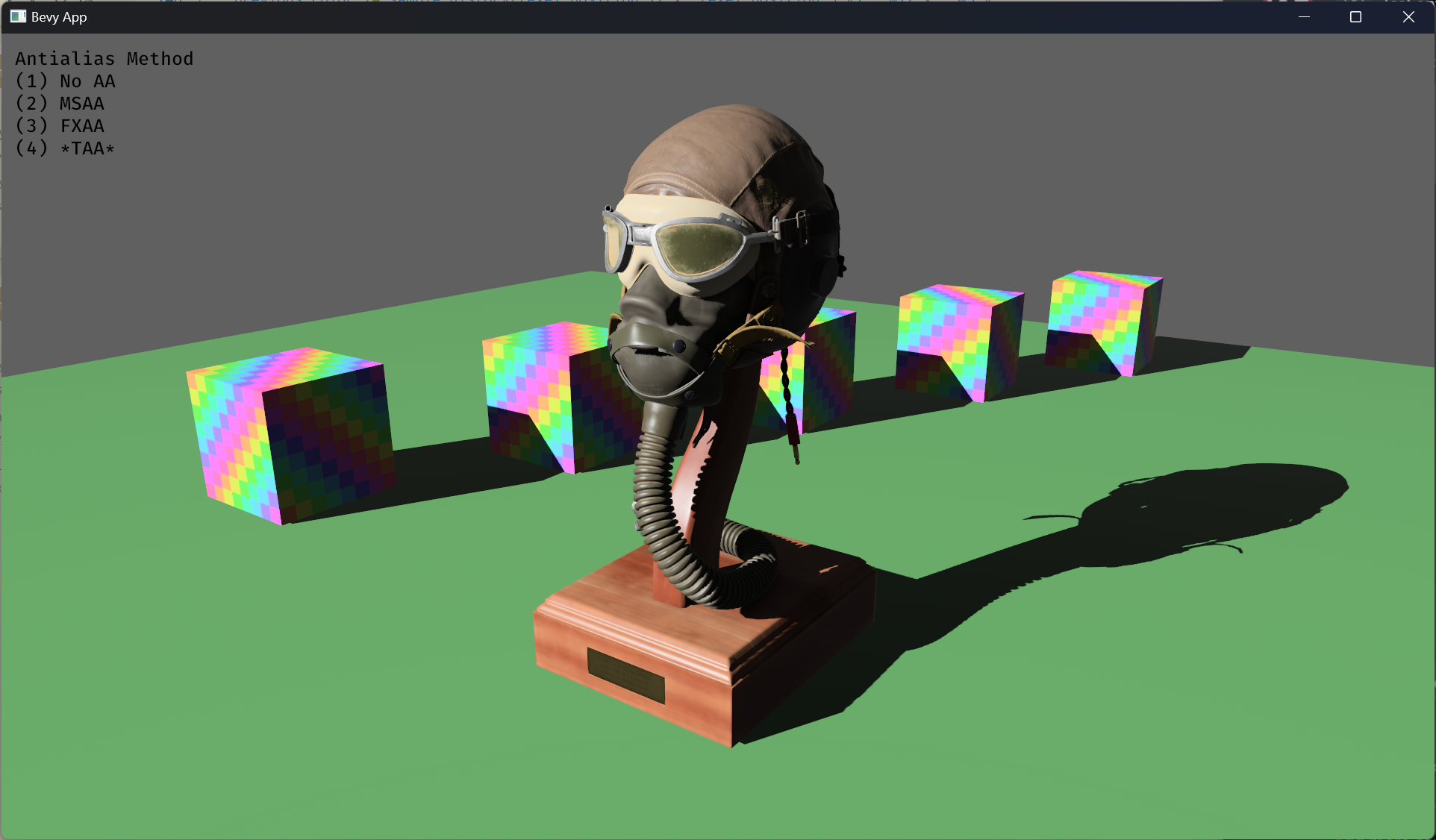
# Objective
- Implement an alternative antialias technique
- TAA scales based off of view resolution, not geometry complexity
- TAA filters textures, firefly pixels, and other aliasing not covered
by MSAA
- TAA additionally will reduce noise / increase quality in future
stochastic rendering techniques
- Closes https://github.com/bevyengine/bevy/issues/3663
## Solution
- Add a temporal jitter component
- Add a motion vector prepass
- Add a TemporalAntialias component and plugin
- Combine existing MSAA and FXAA examples and add TAA
## Followup Work
- Prepass motion vector support for skinned meshes
- Move uniforms needed for motion vectors into a separate bind group,
instead of using different bind group layouts
- Reuse previous frame's GPU view buffer for motion vectors, instead of
recomputing
- Mip biasing for sharper textures, and or unjitter texture UVs
https://github.com/bevyengine/bevy/issues/7323
- Compute shader for better performance
- Investigate FSR techniques
- Historical depth based disocclusion tests, for geometry disocclusion
- Historical luminance/hue based tests, for shading disocclusion
- Pixel "locks" to reduce blending rate / revamp history confidence
mechanism
- Orthographic camera support for TemporalJitter
- Figure out COD's 1-tap bicubic filter
---
## Changelog
- Added MotionVectorPrepass and TemporalJitter
- Added TemporalAntialiasPlugin, TemporalAntialiasBundle, and
TemporalAntialiasSettings
---------
Co-authored-by: IceSentry <c.giguere42@gmail.com>
Co-authored-by: IceSentry <IceSentry@users.noreply.github.com>
Co-authored-by: Robert Swain <robert.swain@gmail.com>
Co-authored-by: Daniel Chia <danstryder@gmail.com>
Co-authored-by: robtfm <50659922+robtfm@users.noreply.github.com>
Co-authored-by: Brandon Dyer <brandondyer64@gmail.com>
Co-authored-by: Edgar Geier <geieredgar@gmail.com>
# Objective
Add a convenient immediate mode drawing API for visual debugging.
Fixes#5619
Alternative to #1625
Partial alternative to #5734
Based off https://github.com/Toqozz/bevy_debug_lines with some changes:
* Simultaneous support for 2D and 3D.
* Methods for basic shapes; circles, spheres, rectangles, boxes, etc.
* 2D methods.
* Removed durations. Seemed niche, and can be handled by users.
<details>
<summary>Performance</summary>
Stress tested using Bevy's recommended optimization settings for the dev
profile with the
following command.
```bash
cargo run --example many_debug_lines \
--config "profile.dev.package.\"*\".opt-level=3" \
--config "profile.dev.opt-level=1"
```
I dipped to 65-70 FPS at 300,000 lines
CPU: 3700x
RAM Speed: 3200 Mhz
GPU: 2070 super - probably not very relevant, mostly cpu/memory bound
</details>
<details>
<summary>Fancy bloom screenshot</summary>
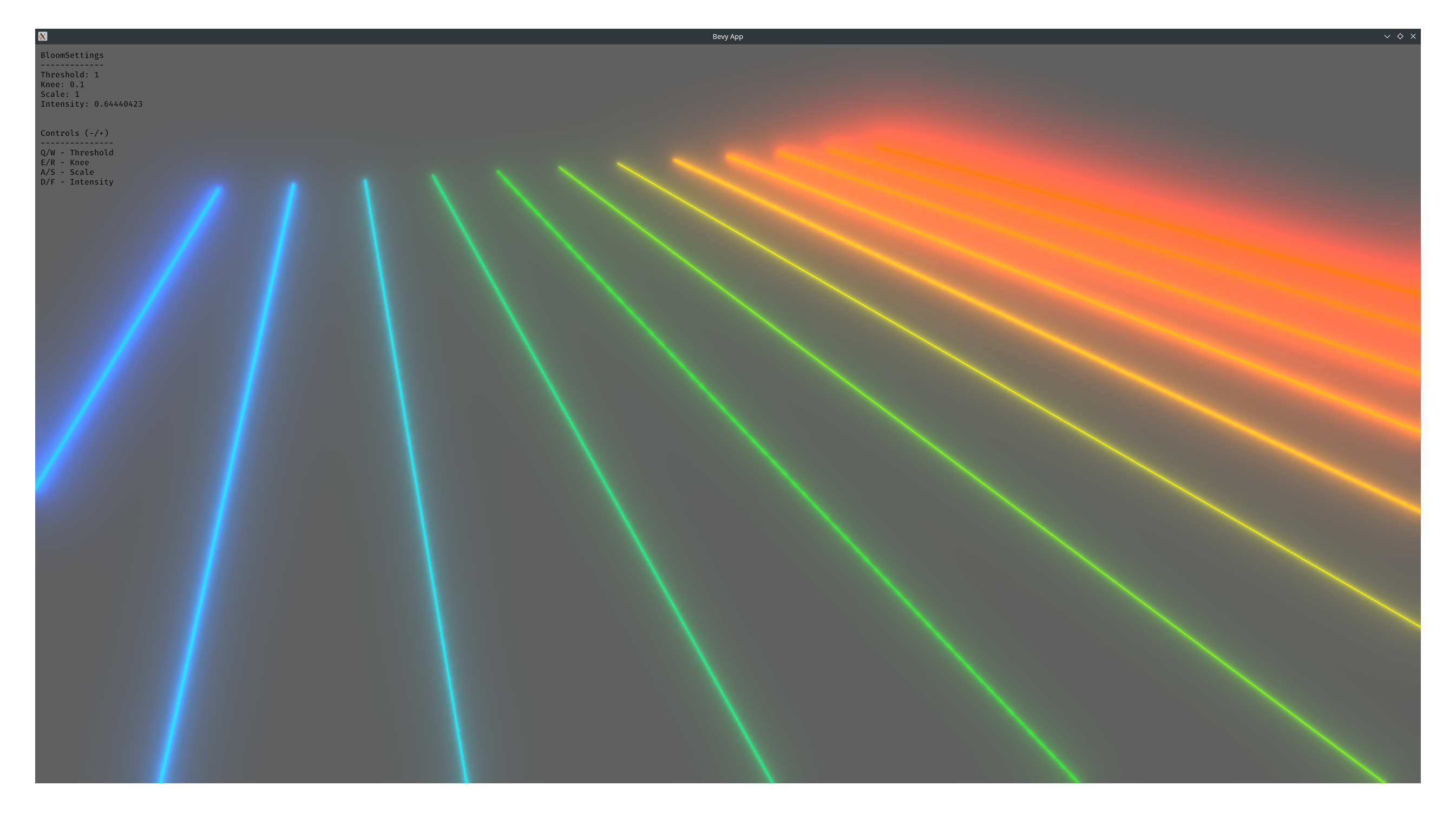
</details>
## Changelog
* Added `GizmoPlugin`
* Added `Gizmos` system parameter for drawing lines and wireshapes.
### TODO
- [ ] Update changelog
- [x] Update performance numbers
- [x] Add credit to PR description
### Future work
- Cache rendering primitives instead of constructing them out of line
segments each frame.
- Support for drawing solid meshes
- Interactions. (See
[bevy_mod_gizmos](https://github.com/LiamGallagher737/bevy_mod_gizmos))
- Fancier line drawing. (See
[bevy_polyline](https://github.com/ForesightMiningSoftwareCorporation/bevy_polyline))
- Support for `RenderLayers`
- Display gizmos for a certain duration. Currently everything displays
for one frame (ie. immediate mode)
- Changing settings per drawn item like drawing on top or drawing to
different `RenderLayers`
Co-Authored By: @lassade <felipe.jorge.pereira@gmail.com>
Co-Authored By: @The5-1 <agaku@hotmail.de>
Co-Authored By: @Toqozz <toqoz@hotmail.com>
Co-Authored By: @nicopap <nico@nicopap.ch>
---------
Co-authored-by: Robert Swain <robert.swain@gmail.com>
Co-authored-by: IceSentry <c.giguere42@gmail.com>
Co-authored-by: Carter Anderson <mcanders1@gmail.com>
This produces more accurate results for the `EmissiveStrengthTest` glTF test case.
(Requires manually setting the emission, for now)
Before: <img width="1392" alt="Screenshot 2023-03-04 at 18 21 25" src="https://user-images.githubusercontent.com/418473/222929455-c7363d52-7133-4d4e-9d6a-562098f6bbe8.png">
After: <img width="1392" alt="Screenshot 2023-03-04 at 18 20 57" src="https://user-images.githubusercontent.com/418473/222929454-3ea20ecb-0773-4aad-978c-3832353b6871.png">
Tagging @JMS55 as a co-author, since this fix is based on their experiments with emission.
# Objective
- Have more accurate results for the `EmissiveStrengthTest` glTF test case.
## Solution
- Make sure we send the emissive color as linear instead of sRGB.
---
## Changelog
- Emission strength is now correctly interpreted by the `StandardMaterial` as linear instead of sRGB.
## Migration Guide
- If you have previously manually specified emissive values with `Color::rgb()` and would like to retain the old visual results, you must now use `Color::rgb_linear()` instead;
- If you have previously manually specified emissive values with `Color::rgb_linear()` and would like to retain the old visual results, you'll need to apply a one-time gamma calculation to your channels manually to get the _actual_ linear RGB value:
- For channel values greater than `0.0031308`, use `(1.055 * value.powf(1.0 / 2.4)) - 0.055`;
- For channel values lower than or equal to `0.0031308`, use `value * 12.92`;
- Otherwise, the results should now be more consistent with other tools/engines.
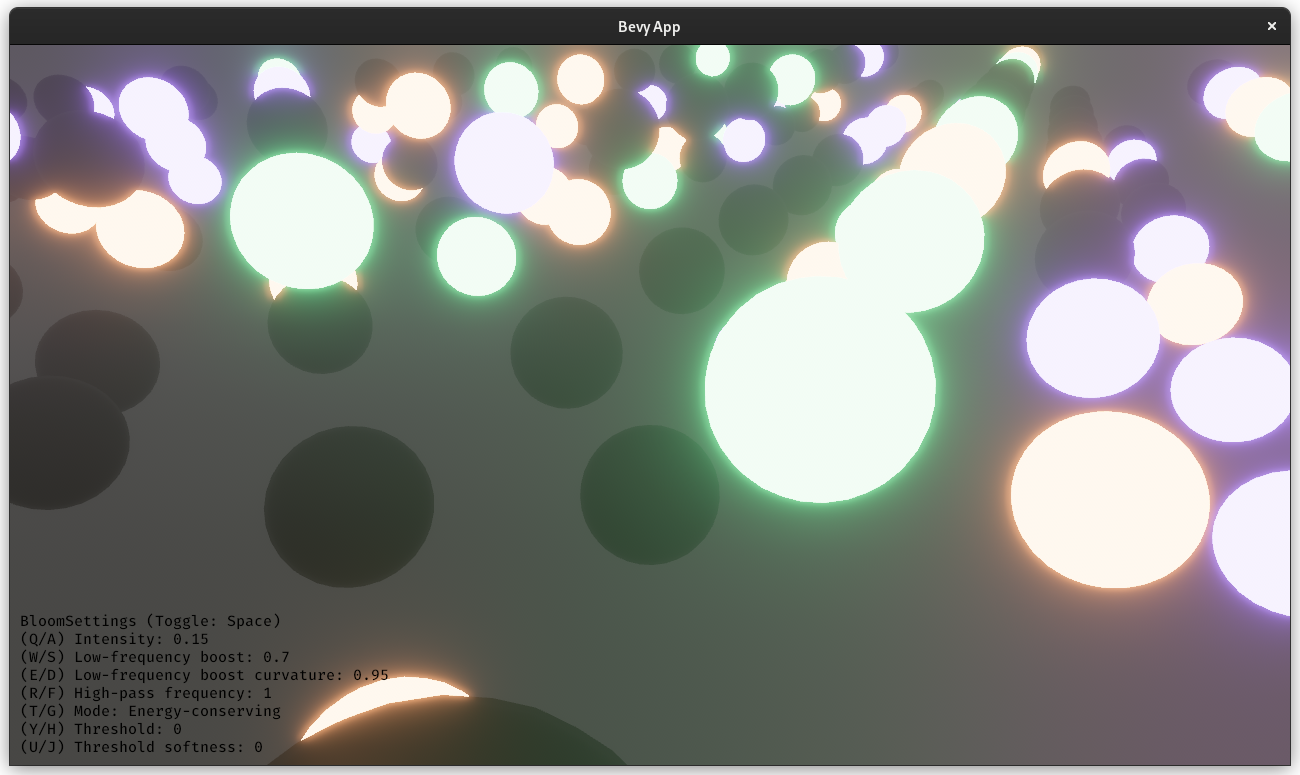
Huge credit to @StarLederer, who did almost all of the work on this. We're just reusing this PR to keep everything in one place.
# Objective
1. Make bloom more physically based.
1. Improve artistic control.
1. Allow to use bloom as screen blur.
1. Fix#6634.
1. Address #6655 (although the author makes incorrect conclusions).
## Solution
1. Set the default threshold to 0.
2. Lerp between bloom textures when `composite_mode: BloomCompositeMode::EnergyConserving`.
1. Use [a parametric function](https://starlederer.github.io/bloom) to control blend levels for each bloom texture. In the future this can be controlled per-pixel for things like lens dirt.
3. Implement BloomCompositeMode::Additive` for situations where the old school look is desired.
## Changelog
* Bloom now looks different.
* Added `BloomSettings:lf_boost`, `BloomSettings:lf_boost_curvature`, `BloomSettings::high_pass_frequency` and `BloomSettings::composite_mode`.
* `BloomSettings::scale` removed.
* `BloomSettings::knee` renamed to `BloomPrefilterSettings::softness`.
* `BloomSettings::threshold` renamed to `BloomPrefilterSettings::threshold`.
* The bloom example has been renamed to bloom_3d and improved. A bloom_2d example was added.
## Migration Guide
* Refactor mentions of `BloomSettings::knee` and `BloomSettings::threshold` as `BloomSettings::prefilter_settings` where knee is now `softness`.
* If defined without `..default()` add `..default()` to definitions of `BloomSettings` instances or manually define missing fields.
* Adapt to Bloom looking visually different (if needed).
Co-authored-by: Herman Lederer <germans.lederers@gmail.com>
# Objective
Splits tone mapping from https://github.com/bevyengine/bevy/pull/6677 into a separate PR.
Address https://github.com/bevyengine/bevy/issues/2264.
Adds tone mapping options:
- None: Bypasses tonemapping for instances where users want colors output to match those set.
- Reinhard
- Reinhard Luminance: Bevy's exiting tonemapping
- [ACES](https://github.com/TheRealMJP/BakingLab/blob/master/BakingLab/ACES.hlsl) (Fitted version, based on the same implementation that Godot 4 uses) see https://github.com/bevyengine/bevy/issues/2264
- [AgX](https://github.com/sobotka/AgX)
- SomewhatBoringDisplayTransform
- TonyMcMapface
- Blender Filmic
This PR also adds support for EXR images so they can be used to compare tonemapping options with reference images.
## Migration Guide
- Tonemapping is now an enum with NONE and the various tonemappers.
- The DebandDither is now a separate component.
Co-authored-by: JMS55 <47158642+JMS55@users.noreply.github.com>
# Objective
Fixes#7295
Should we maybe default to 4x if 2x/8x is selected but not supported?
---
## Changelog
- Added 2x and 8x sample counts for MSAA.
# Objective
- Environment maps use these formats, and in the future rendering LUTs will need textures loaded by default in the engine
## Solution
- Make ktx2 and zstd part of the default feature
- Let examples assume these features are enabled
---
## Changelog
- `ktx2` and `zstd` are now party of bevy's default enabled features
## Migration Guide
- If you used the `ktx2` or `zstd` features, you no longer need to explicitly enable them, as they are now part of bevy's default enabled features
# Objective
- Required features were added to some examples in #7051 even though those features aren't the main focus of the examples
- Don't require features on examples that are useful without them
## Solution
- Remove required features on examples `load_gltf` and `scene_viewer`, but log a warning when they are not enabled
# Objective
There was issue #191 requesting subdivisions on the shape::Plane.
I also could have used this recently. I then write the solution.
Fixes #191
## Solution
I changed the shape::Plane to include subdivisions field and the code to create the subdivisions. I don't know how people are counting subdivisions so as I put in the doc comments 0 subdivisions results in the original geometry of the Plane.
Greater then 0 results in the number of lines dividing the plane.
I didn't know if it would be better to create a new struct that implemented this feature, say SubdivisionPlane or change Plane. I decided on changing Plane as that was what the original issue was.
It would be trivial to alter this to use another struct instead of altering Plane.
The issues of migration, although small, would be eliminated if a new struct was implemented.
## Changelog
### Added
Added subdivisions field to shape::Plane
## Migration Guide
All the examples needed to be updated to initalize the subdivisions field.
Also there were two tests in tests/window that need to be updated.
A user would have to update all their uses of shape::Plane to initalize the subdivisions field.
(Before)
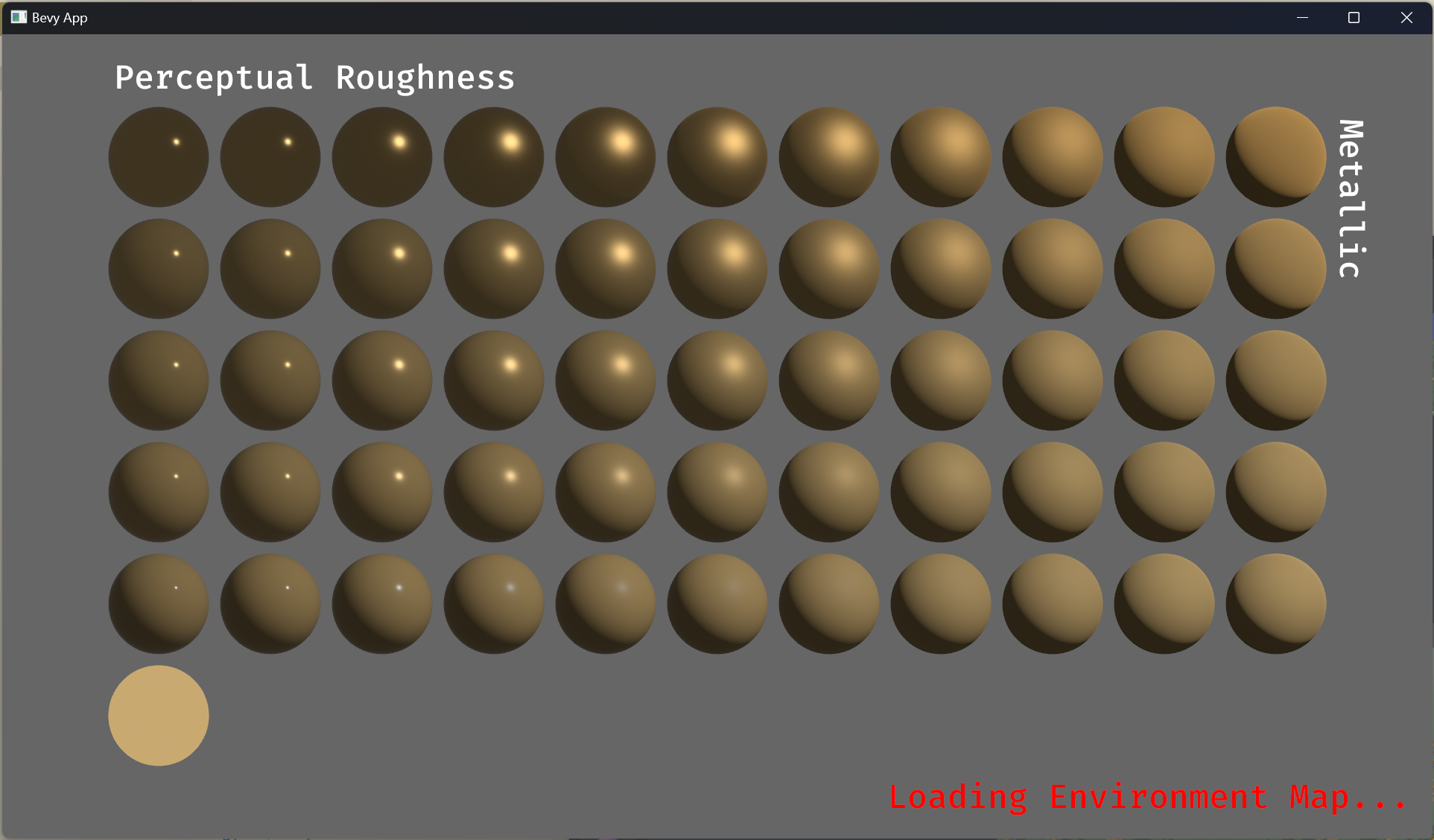
(After)
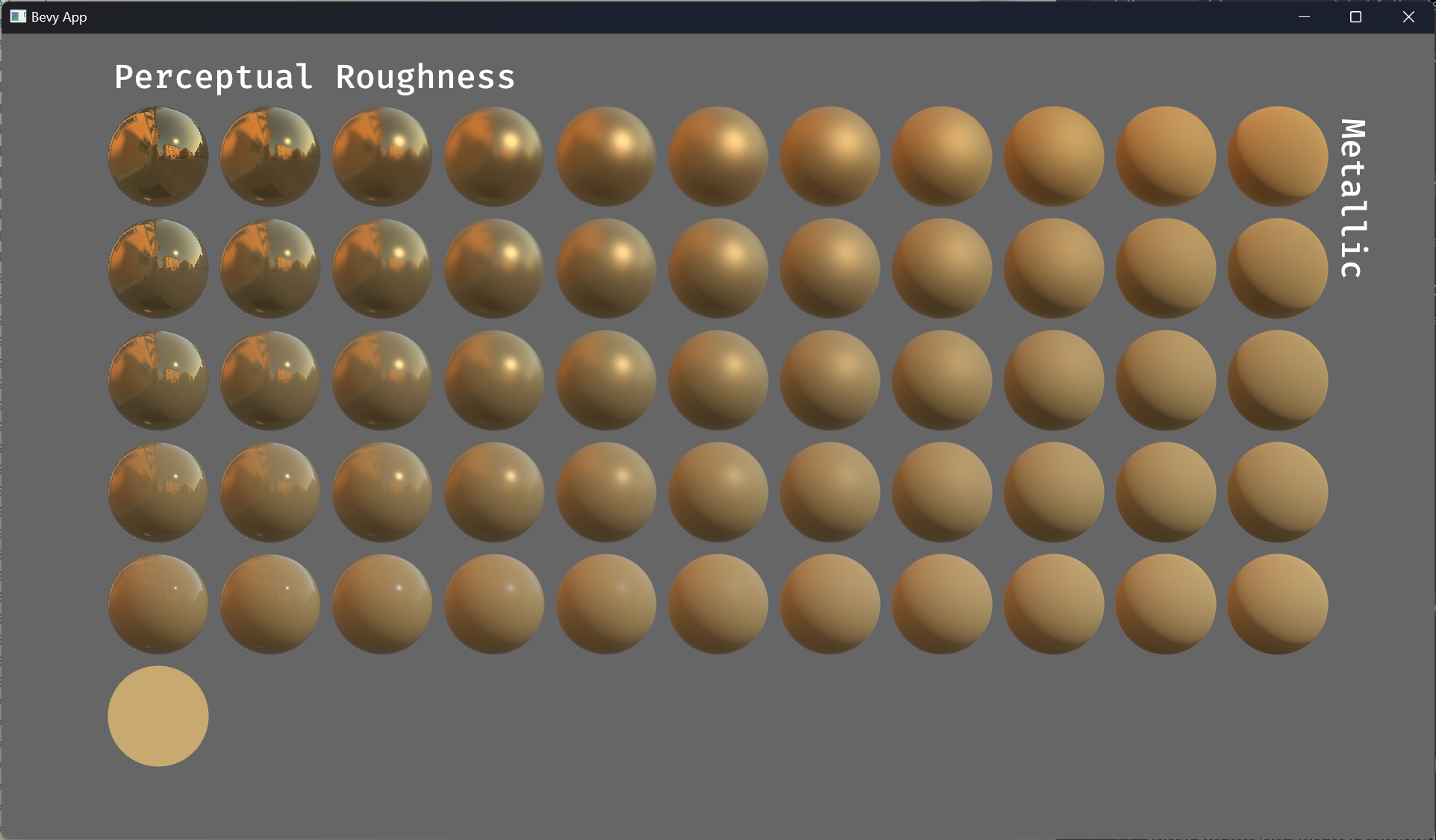
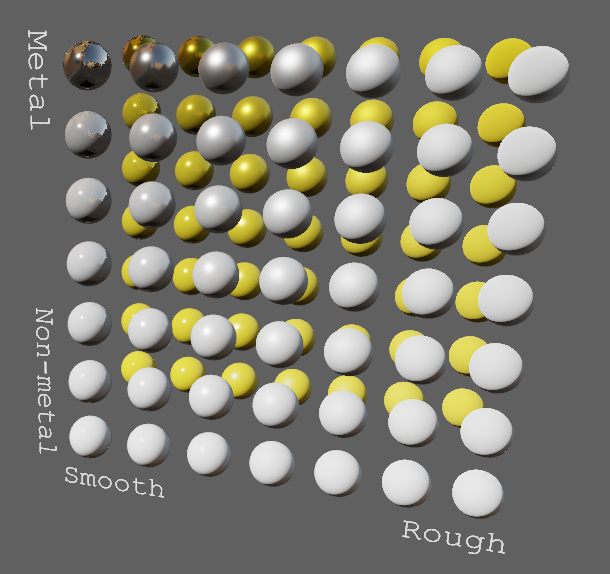
# Objective
- Improve lighting; especially reflections.
- Closes https://github.com/bevyengine/bevy/issues/4581.
## Solution
- Implement environment maps, providing better ambient light.
- Add microfacet multibounce approximation for specular highlights from Filament.
- Occlusion is no longer incorrectly applied to direct lighting. It now only applies to diffuse indirect light. Unsure if it's also supposed to apply to specular indirect light - the glTF specification just says "indirect light". In the case of ambient occlusion, for instance, that's usually only calculated as diffuse though. For now, I'm choosing to apply this just to indirect diffuse light, and not specular.
- Modified the PBR example to use an environment map, and have labels.
- Added `FallbackImageCubemap`.
## Implementation
- IBL technique references can be found in environment_map.wgsl.
- It's more accurate to use a LUT for the scale/bias. Filament has a good reference on generating this LUT. For now, I just used an analytic approximation.
- For now, environment maps must first be prefiltered outside of bevy using a 3rd party tool. See the `EnvironmentMap` documentation.
- Eventually, we should have our own prefiltering code, so that we can have dynamically changing environment maps, as well as let users drop in an HDR image and use asset preprocessing to create the needed textures using only bevy.
---
## Changelog
- Added an `EnvironmentMapLight` camera component that adds additional ambient light to a scene.
- StandardMaterials will now appear brighter and more saturated at high roughness, due to internal material changes. This is more physically correct.
- Fixed StandardMaterial occlusion being incorrectly applied to direct lighting.
- Added `FallbackImageCubemap`.
Co-authored-by: IceSentry <c.giguere42@gmail.com>
Co-authored-by: James Liu <contact@jamessliu.com>
Co-authored-by: Rob Parrett <robparrett@gmail.com>
# Objective
NOTE: This depends on #7267 and should not be merged until #7267 is merged. If you are reviewing this before that is merged, I highly recommend viewing the Base Sets commit instead of trying to find my changes amongst those from #7267.
"Default sets" as described by the [Stageless RFC](https://github.com/bevyengine/rfcs/pull/45) have some [unfortunate consequences](https://github.com/bevyengine/bevy/discussions/7365).
## Solution
This adds "base sets" as a variant of `SystemSet`:
A set is a "base set" if `SystemSet::is_base` returns `true`. Typically this will be opted-in to using the `SystemSet` derive:
```rust
#[derive(SystemSet, Clone, Hash, Debug, PartialEq, Eq)]
#[system_set(base)]
enum MyBaseSet {
A,
B,
}
```
**Base sets are exclusive**: a system can belong to at most one "base set". Adding a system to more than one will result in an error. When possible we fail immediately during system-config-time with a nice file + line number. For the more nested graph-ey cases, this will fail at the final schedule build.
**Base sets cannot belong to other sets**: this is where the word "base" comes from
Systems and Sets can only be added to base sets using `in_base_set`. Calling `in_set` with a base set will fail. As will calling `in_base_set` with a normal set.
```rust
app.add_system(foo.in_base_set(MyBaseSet::A))
// X must be a normal set ... base sets cannot be added to base sets
.configure_set(X.in_base_set(MyBaseSet::A))
```
Base sets can still be configured like normal sets:
```rust
app.add_system(MyBaseSet::B.after(MyBaseSet::Ap))
```
The primary use case for base sets is enabling a "default base set":
```rust
schedule.set_default_base_set(CoreSet::Update)
// this will belong to CoreSet::Update by default
.add_system(foo)
// this will override the default base set with PostUpdate
.add_system(bar.in_base_set(CoreSet::PostUpdate))
```
This allows us to build apis that work by default in the standard Bevy style. This is a rough analog to the "default stage" model, but it use the new "stageless sets" model instead, with all of the ordering flexibility (including exclusive systems) that it provides.
---
## Changelog
- Added "base sets" and ported CoreSet to use them.
## Migration Guide
TODO
Huge thanks to @maniwani, @devil-ira, @hymm, @cart, @superdump and @jakobhellermann for the help with this PR.
# Objective
- Followup #6587.
- Minimal integration for the Stageless Scheduling RFC: https://github.com/bevyengine/rfcs/pull/45
## Solution
- [x] Remove old scheduling module
- [x] Migrate new methods to no longer use extension methods
- [x] Fix compiler errors
- [x] Fix benchmarks
- [x] Fix examples
- [x] Fix docs
- [x] Fix tests
## Changelog
### Added
- a large number of methods on `App` to work with schedules ergonomically
- the `CoreSchedule` enum
- `App::add_extract_system` via the `RenderingAppExtension` trait extension method
- the private `prepare_view_uniforms` system now has a public system set for scheduling purposes, called `ViewSet::PrepareUniforms`
### Removed
- stages, and all code that mentions stages
- states have been dramatically simplified, and no longer use a stack
- `RunCriteriaLabel`
- `AsSystemLabel` trait
- `on_hierarchy_reports_enabled` run criteria (now just uses an ad hoc resource checking run condition)
- systems in `RenderSet/Stage::Extract` no longer warn when they do not read data from the main world
- `RunCriteriaLabel`
- `transform_propagate_system_set`: this was a nonstandard pattern that didn't actually provide enough control. The systems are already `pub`: the docs have been updated to ensure that the third-party usage is clear.
### Changed
- `System::default_labels` is now `System::default_system_sets`.
- `App::add_default_labels` is now `App::add_default_sets`
- `CoreStage` and `StartupStage` enums are now `CoreSet` and `StartupSet`
- `App::add_system_set` was renamed to `App::add_systems`
- The `StartupSchedule` label is now defined as part of the `CoreSchedules` enum
- `.label(SystemLabel)` is now referred to as `.in_set(SystemSet)`
- `SystemLabel` trait was replaced by `SystemSet`
- `SystemTypeIdLabel<T>` was replaced by `SystemSetType<T>`
- The `ReportHierarchyIssue` resource now has a public constructor (`new`), and implements `PartialEq`
- Fixed time steps now use a schedule (`CoreSchedule::FixedTimeStep`) rather than a run criteria.
- Adding rendering extraction systems now panics rather than silently failing if no subapp with the `RenderApp` label is found.
- the `calculate_bounds` system, with the `CalculateBounds` label, is now in `CoreSet::Update`, rather than in `CoreSet::PostUpdate` before commands are applied.
- `SceneSpawnerSystem` now runs under `CoreSet::Update`, rather than `CoreStage::PreUpdate.at_end()`.
- `bevy_pbr::add_clusters` is no longer an exclusive system
- the top level `bevy_ecs::schedule` module was replaced with `bevy_ecs::scheduling`
- `tick_global_task_pools_on_main_thread` is no longer run as an exclusive system. Instead, it has been replaced by `tick_global_task_pools`, which uses a `NonSend` resource to force running on the main thread.
## Migration Guide
- Calls to `.label(MyLabel)` should be replaced with `.in_set(MySet)`
- Stages have been removed. Replace these with system sets, and then add command flushes using the `apply_system_buffers` exclusive system where needed.
- The `CoreStage`, `StartupStage, `RenderStage` and `AssetStage` enums have been replaced with `CoreSet`, `StartupSet, `RenderSet` and `AssetSet`. The same scheduling guarantees have been preserved.
- Systems are no longer added to `CoreSet::Update` by default. Add systems manually if this behavior is needed, although you should consider adding your game logic systems to `CoreSchedule::FixedTimestep` instead for more reliable framerate-independent behavior.
- Similarly, startup systems are no longer part of `StartupSet::Startup` by default. In most cases, this won't matter to you.
- For example, `add_system_to_stage(CoreStage::PostUpdate, my_system)` should be replaced with
- `add_system(my_system.in_set(CoreSet::PostUpdate)`
- When testing systems or otherwise running them in a headless fashion, simply construct and run a schedule using `Schedule::new()` and `World::run_schedule` rather than constructing stages
- Run criteria have been renamed to run conditions. These can now be combined with each other and with states.
- Looping run criteria and state stacks have been removed. Use an exclusive system that runs a schedule if you need this level of control over system control flow.
- For app-level control flow over which schedules get run when (such as for rollback networking), create your own schedule and insert it under the `CoreSchedule::Outer` label.
- Fixed timesteps are now evaluated in a schedule, rather than controlled via run criteria. The `run_fixed_timestep` system runs this schedule between `CoreSet::First` and `CoreSet::PreUpdate` by default.
- Command flush points introduced by `AssetStage` have been removed. If you were relying on these, add them back manually.
- Adding extract systems is now typically done directly on the main app. Make sure the `RenderingAppExtension` trait is in scope, then call `app.add_extract_system(my_system)`.
- the `calculate_bounds` system, with the `CalculateBounds` label, is now in `CoreSet::Update`, rather than in `CoreSet::PostUpdate` before commands are applied. You may need to order your movement systems to occur before this system in order to avoid system order ambiguities in culling behavior.
- the `RenderLabel` `AppLabel` was renamed to `RenderApp` for clarity
- `App::add_state` now takes 0 arguments: the starting state is set based on the `Default` impl.
- Instead of creating `SystemSet` containers for systems that run in stages, simply use `.on_enter::<State::Variant>()` or its `on_exit` or `on_update` siblings.
- `SystemLabel` derives should be replaced with `SystemSet`. You will also need to add the `Debug`, `PartialEq`, `Eq`, and `Hash` traits to satisfy the new trait bounds.
- `with_run_criteria` has been renamed to `run_if`. Run criteria have been renamed to run conditions for clarity, and should now simply return a bool.
- States have been dramatically simplified: there is no longer a "state stack". To queue a transition to the next state, call `NextState::set`
## TODO
- [x] remove dead methods on App and World
- [x] add `App::add_system_to_schedule` and `App::add_systems_to_schedule`
- [x] avoid adding the default system set at inappropriate times
- [x] remove any accidental cycles in the default plugins schedule
- [x] migrate benchmarks
- [x] expose explicit labels for the built-in command flush points
- [x] migrate engine code
- [x] remove all mentions of stages from the docs
- [x] verify docs for States
- [x] fix uses of exclusive systems that use .end / .at_start / .before_commands
- [x] migrate RenderStage and AssetStage
- [x] migrate examples
- [x] ensure that transform propagation is exported in a sufficiently public way (the systems are already pub)
- [x] ensure that on_enter schedules are run at least once before the main app
- [x] re-enable opt-in to execution order ambiguities
- [x] revert change to `update_bounds` to ensure it runs in `PostUpdate`
- [x] test all examples
- [x] unbreak directional lights
- [x] unbreak shadows (see 3d_scene, 3d_shape, lighting, transparaency_3d examples)
- [x] game menu example shows loading screen and menu simultaneously
- [x] display settings menu is a blank screen
- [x] `without_winit` example panics
- [x] ensure all tests pass
- [x] SubApp doc test fails
- [x] runs_spawn_local tasks fails
- [x] [Fix panic_when_hierachy_cycle test hanging](https://github.com/alice-i-cecile/bevy/pull/120)
## Points of Difficulty and Controversy
**Reviewers, please give feedback on these and look closely**
1. Default sets, from the RFC, have been removed. These added a tremendous amount of implicit complexity and result in hard to debug scheduling errors. They're going to be tackled in the form of "base sets" by @cart in a followup.
2. The outer schedule controls which schedule is run when `App::update` is called.
3. I implemented `Label for `Box<dyn Label>` for our label types. This enables us to store schedule labels in concrete form, and then later run them. I ran into the same set of problems when working with one-shot systems. We've previously investigated this pattern in depth, and it does not appear to lead to extra indirection with nested boxes.
4. `SubApp::update` simply runs the default schedule once. This sucks, but this whole API is incomplete and this was the minimal changeset.
5. `time_system` and `tick_global_task_pools_on_main_thread` no longer use exclusive systems to attempt to force scheduling order
6. Implemetnation strategy for fixed timesteps
7. `AssetStage` was migrated to `AssetSet` without reintroducing command flush points. These did not appear to be used, and it's nice to remove these bottlenecks.
8. Migration of `bevy_render/lib.rs` and pipelined rendering. The logic here is unusually tricky, as we have complex scheduling requirements.
## Future Work (ideally before 0.10)
- Rename schedule_v3 module to schedule or scheduling
- Add a derive macro to states, and likely a `EnumIter` trait of some form
- Figure out what exactly to do with the "systems added should basically work by default" problem
- Improve ergonomics for working with fixed timesteps and states
- Polish FixedTime API to match Time
- Rebase and merge #7415
- Resolve all internal ambiguities (blocked on better tools, especially #7442)
- Add "base sets" to replace the removed default sets.
# Objective
- Improve ergonomics / documentation of cascaded shadow maps
- Allow for the customization of the nearest shadowing distance.
- Fixes#7393
- Fixes#7362
## Solution
- Introduce `CascadeShadowConfigBuilder`
- Tweak various example cascade settings for better quality.
---
## Changelog
- Made examples look nicer under cascaded shadow maps.
- Introduce `CascadeShadowConfigBuilder` to help with creating `CascadeShadowConfig`
## Migration Guide
- Configure settings for cascaded shadow maps for directional lights using the newly introduced `CascadeShadowConfigBuilder`.
Co-authored-by: Robert Swain <robert.swain@gmail.com>
# Objective
Update Bevy to wgpu 0.15.
## Changelog
- Update to wgpu 0.15, wgpu-hal 0.15.1, and naga 0.11
- Users can now use the [DirectX Shader Compiler](https://github.com/microsoft/DirectXShaderCompiler) (DXC) on Windows with DX12 for faster shader compilation and ShaderModel 6.0+ support (requires `dxcompiler.dll` and `dxil.dll`, which are included in DXC downloads from [here](https://github.com/microsoft/DirectXShaderCompiler/releases/latest))
## Migration Guide
### WGSL Top-Level `let` is now `const`
All top level constants are now declared with `const`, catching up with the wgsl spec.
`let` is no longer allowed at the global scope, only within functions.
```diff
-let SOME_CONSTANT = 12.0;
+const SOME_CONSTANT = 12.0;
```
#### `TextureDescriptor` and `SurfaceConfiguration` now requires a `view_formats` field
The new `view_formats` field in the `TextureDescriptor` is used to specify a list of formats the texture can be re-interpreted to in a texture view. Currently only changing srgb-ness is allowed (ex. `Rgba8Unorm` <=> `Rgba8UnormSrgb`). You should set `view_formats` to `&[]` (empty) unless you have a specific reason not to.
#### The DirectX Shader Compiler (DXC) is now supported on DX12
DXC is now the default shader compiler when using the DX12 backend. DXC is Microsoft's replacement for their legacy FXC compiler, and is faster, less buggy, and allows for modern shader features to be used (ShaderModel 6.0+). DXC requires `dxcompiler.dll` and `dxil.dll` to be available, otherwise it will log a warning and fall back to FXC.
You can get `dxcompiler.dll` and `dxil.dll` by downloading the latest release from [Microsoft's DirectXShaderCompiler github repo](https://github.com/microsoft/DirectXShaderCompiler/releases/latest) and copying them into your project's root directory. These must be included when you distribute your Bevy game/app/etc if you plan on supporting the DX12 backend and are using DXC.
`WgpuSettings` now has a `dx12_shader_compiler` field which can be used to choose between either FXC or DXC (if you pass None for the paths for DXC, it will check for the .dlls in the working directory).
<img width="1392" alt="image" src="https://user-images.githubusercontent.com/418473/203873533-44c029af-13b7-4740-8ea3-af96bd5867c9.png">
<img width="1392" alt="image" src="https://user-images.githubusercontent.com/418473/203873549-36be7a23-b341-42a2-8a9f-ceea8ac7a2b8.png">
# Objective
- Add support for the “classic” distance fog effect, as well as a more advanced atmospheric fog effect.
## Solution
This PR:
- Introduces a new `FogSettings` component that controls distance fog per-camera.
- Adds support for three widely used “traditional” fog falloff modes: `Linear`, `Exponential` and `ExponentialSquared`, as well as a more advanced `Atmospheric` fog;
- Adds support for directional light influence over fog color;
- Extracts fog via `ExtractComponent`, then uses a prepare system that sets up a new dynamic uniform struct (`Fog`), similar to other mesh view types;
- Renders fog in PBR material shader, as a final adjustment to the `output_color`, after PBR is computed (but before tone mapping);
- Adds a new `StandardMaterial` flag to enable fog; (`fog_enabled`)
- Adds convenience methods for easier artistic control when creating non-linear fog types;
- Adds documentation around fog.
---
## Changelog
### Added
- Added support for distance-based fog effects for PBR materials, controllable per-camera via the new `FogSettings` component;
- Added `FogFalloff` enum for selecting between three widely used “traditional” fog falloff modes: `Linear`, `Exponential` and `ExponentialSquared`, as well as a more advanced `Atmospheric` fog;
Co-authored-by: Robert Swain <robert.swain@gmail.com>
# Objective
Implements cascaded shadow maps for directional lights, which produces better quality shadows without needing excessively large shadow maps.
Fixes#3629
Before
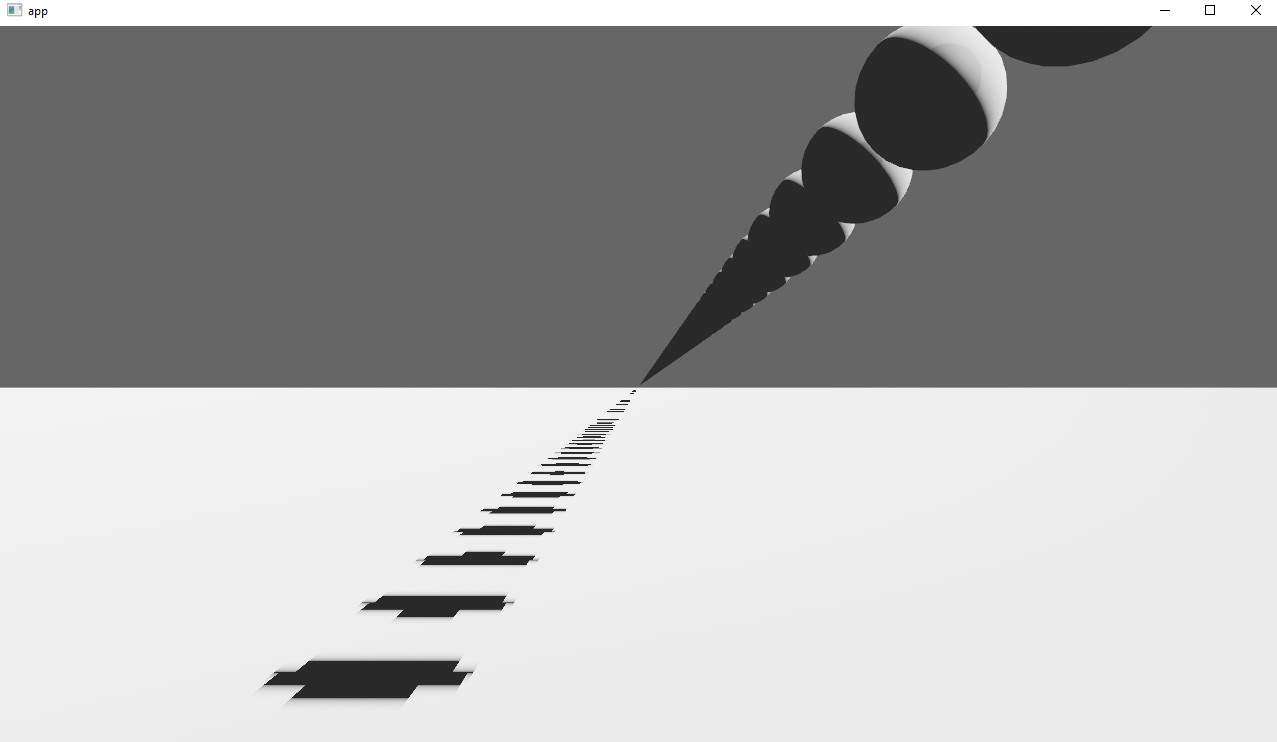
After
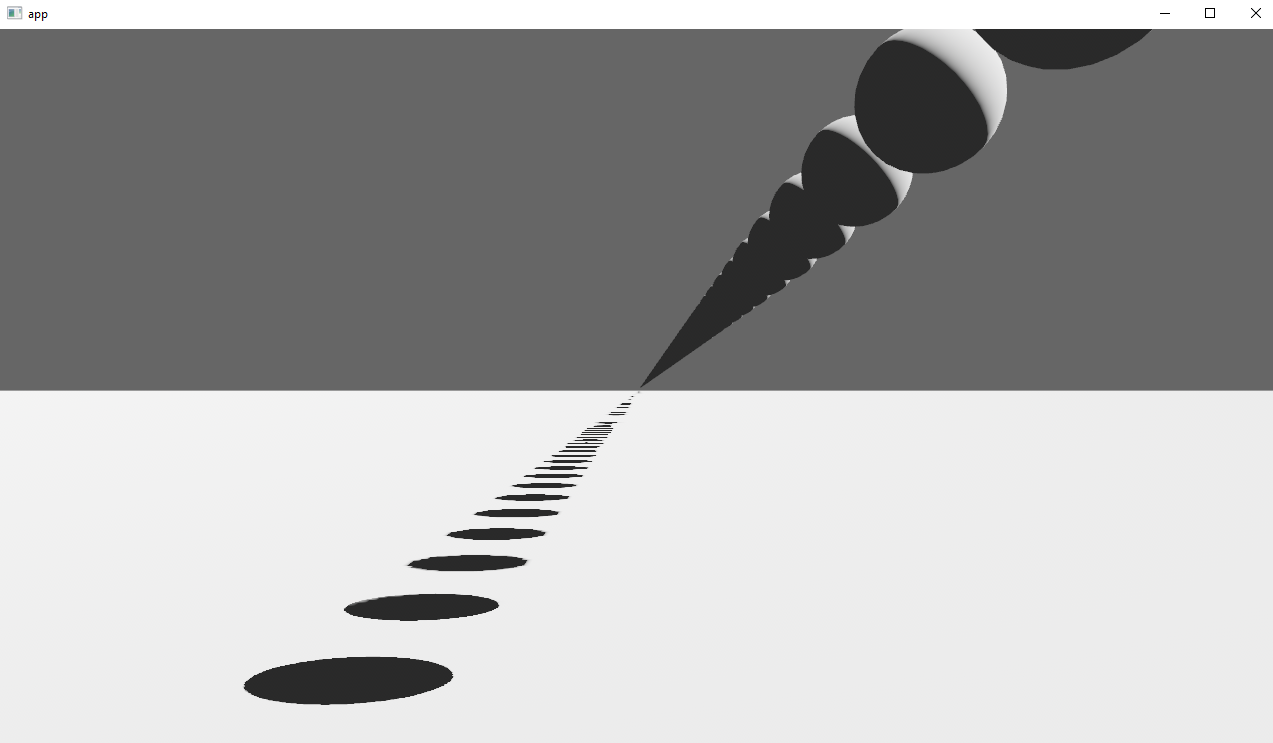
## Solution
Rather than rendering a single shadow map for directional light, the view frustum is divided into a series of cascades, each of which gets its own shadow map. The correct cascade is then sampled for shadow determination.
---
## Changelog
Directional lights now use cascaded shadow maps for improved shadow quality.
## Migration Guide
You no longer have to manually specify a `shadow_projection` for a directional light, and these settings should be removed. If customization of how cascaded shadow maps work is desired, modify the `CascadeShadowConfig` component instead.
# Objective
- This PR adds support for blend modes to the PBR `StandardMaterial`.
<img width="1392" alt="Screenshot 2022-11-18 at 20 00 56" src="https://user-images.githubusercontent.com/418473/202820627-0636219a-a1e5-437a-b08b-b08c6856bf9c.png">
<img width="1392" alt="Screenshot 2022-11-18 at 20 01 01" src="https://user-images.githubusercontent.com/418473/202820615-c8d43301-9a57-49c4-bd21-4ae343c3e9ec.png">
## Solution
- The existing `AlphaMode` enum is extended, adding three more modes: `AlphaMode::Premultiplied`, `AlphaMode::Add` and `AlphaMode::Multiply`;
- All new modes are rendered in the existing `Transparent3d` phase;
- The existing mesh flags for alpha mode are reorganized for a more compact/efficient representation, and new values are added;
- `MeshPipelineKey::TRANSPARENT_MAIN_PASS` is refactored into `MeshPipelineKey::BLEND_BITS`.
- `AlphaMode::Opaque` and `AlphaMode::Mask(f32)` share a single opaque pipeline key: `MeshPipelineKey::BLEND_OPAQUE`;
- `Blend`, `Premultiplied` and `Add` share a single premultiplied alpha pipeline key, `MeshPipelineKey::BLEND_PREMULTIPLIED_ALPHA`. In the shader, color values are premultiplied accordingly (or not) depending on the blend mode to produce the three different results after PBR/tone mapping/dithering;
- `Multiply` uses its own independent pipeline key, `MeshPipelineKey::BLEND_MULTIPLY`;
- Example and documentation are provided.
---
## Changelog
### Added
- Added support for additive and multiplicative blend modes in the PBR `StandardMaterial`, via `AlphaMode::Add` and `AlphaMode::Multiply`;
- Added support for premultiplied alpha in the PBR `StandardMaterial`, via `AlphaMode::Premultiplied`;
# Objective
Fixes#6931
Continues #6954 by squashing `Msaa` to a flat enum
Helps out #7215
# Solution
```
pub enum Msaa {
Off = 1,
#[default]
Sample4 = 4,
}
```
# Changelog
- Modified
- `Msaa` is now enum
- Defaults to 4 samples
- Uses `.samples()` method to get the sample number as `u32`
# Migration Guide
```
let multi = Msaa { samples: 4 }
// is now
let multi = Msaa::Sample4
multi.samples
// is now
multi.samples()
```
Co-authored-by: Sjael <jakeobrien44@gmail.com>
# Objective
Fix https://github.com/bevyengine/bevy/issues/4530
- Make it easier to open/close/modify windows by setting them up as `Entity`s with a `Window` component.
- Make multiple windows very simple to set up. (just add a `Window` component to an entity and it should open)
## Solution
- Move all properties of window descriptor to ~components~ a component.
- Replace `WindowId` with `Entity`.
- ~Use change detection for components to update backend rather than events/commands. (The `CursorMoved`/`WindowResized`/... events are kept for user convenience.~
Check each field individually to see what we need to update, events are still kept for user convenience.
---
## Changelog
- `WindowDescriptor` renamed to `Window`.
- Width/height consolidated into a `WindowResolution` component.
- Requesting maximization/minimization is done on the [`Window::state`] field.
- `WindowId` is now `Entity`.
## Migration Guide
- Replace `WindowDescriptor` with `Window`.
- Change `width` and `height` fields in a `WindowResolution`, either by doing
```rust
WindowResolution::new(width, height) // Explicitly
// or using From<_> for tuples for convenience
(1920., 1080.).into()
```
- Replace any `WindowCommand` code to just modify the `Window`'s fields directly and creating/closing windows is now by spawning/despawning an entity with a `Window` component like so:
```rust
let window = commands.spawn(Window { ... }).id(); // open window
commands.entity(window).despawn(); // close window
```
## Unresolved
- ~How do we tell when a window is minimized by a user?~
~Currently using the `Resize(0, 0)` as an indicator of minimization.~
No longer attempting to tell given how finnicky this was across platforms, now the user can only request that a window be maximized/minimized.
## Future work
- Move `exit_on_close` functionality out from windowing and into app(?)
- https://github.com/bevyengine/bevy/issues/5621
- https://github.com/bevyengine/bevy/issues/7099
- https://github.com/bevyengine/bevy/issues/7098
Co-authored-by: Carter Anderson <mcanders1@gmail.com>
# Objective
- When using `Color::hex` for the first time, I was confused by the fact that I can't specify colors using #, which is much more familiar.
- In the code editor (if there is support) there is a preview of the color, which is very convenient.

## Solution
- Allow you to enter colors like `#ff33f2` and use the `.strip_prefix` method to delete the `#` character.
# Objective
The documentation for camera priority is very confusing at the moment, it requires a bit of "double negative" kind of thinking.
# Solution
Flipping the wording on the documentation to reflect more common usecases like having an overlay camera and also renaming it to "order", since priority implies that it will override the other camera rather than have both run.
# Objective
The `WgpuSettings` resource is only used during plugin build. Move it into the `RenderPlugin` struct.
Changing these settings requires re-initializing the render context, which is currently not supported.
If it is supported in the future it should probably be more explicit than changing a field on a resource, maybe something similar to the `CreateWindow` event.
## Migration Guide
```rust
// Before (0.9)
App::new()
.insert_resource(WgpuSettings { .. })
.add_plugins(DefaultPlugins)
// After (0.10)
App::new()
.add_plugins(DefaultPlugins.set(RenderPlugin {
wgpu_settings: WgpuSettings { .. },
}))
```
Co-authored-by: devil-ira <justthecooldude@gmail.com>
# Objective
`AsBindGroup` can't be used as a trait object because of the constraint `Sized` and because of the associated function.
This is a problem for [`bevy_atmosphere`](https://github.com/JonahPlusPlus/bevy_atmosphere) because it needs to use a trait that depends on `AsBindGroup` as a trait object, for switching out different shaders at runtime. The current solution it employs is reimplementing the trait and derive macro into that trait, instead of constraining to `AsBindGroup`.
## Solution
Remove the `Sized` constraint from `AsBindGroup` and add the constraint `where Self: Sized` to the associated function `bind_group_layout`. Also change `PreparedBindGroup<T: AsBindGroup>` to `PreparedBindGroup<T>` and use it as `PreparedBindGroup<Self::Data>` instead of `PreparedBindGroup<Self>`.
This weakens the constraints, but increases the flexibility of `AsBindGroup`.
I'm not entirely sure why the `Sized` constraint was there, because it worked fine without it (maybe @cart wasn't aware of use cases for `AsBindGroup` as a trait object or this was just leftover from legacy code?).
---
## Changelog
- `AsBindGroup` can be used as a trait object.
# Objective
Adds a cylinder shape. Fixes#2282.
## Solution
- I added a custom cylinder shape, taken from [here](https://github.com/rparrett/typey_birb/blob/main/src/cylinder.rs) with permission from @rparrett.
- I also added the cylinder shape to the `3d_shapes` example scene.
---
## Changelog
- Added cylinder shape
Co-Authored-By: Rob Parrett <robparrett@gmail.com>
Co-Authored-By: davidhof <7483215+davidhof@users.noreply.github.com>
# Objective
The bloom example has a 2d camera for the UI. This is an artifact of an older version of bevy. All cameras can render the UI now.
## Solution
Remove the 2d camera
Allow passing `Vec`s of glam vector types as vertex attributes.
Alternative to #4548 and #2719
Also used some macros to cut down on all the repetition.
# Migration Guide
Implementations of `From<Vec<[u16; 4]>>` and `From<Vec<[u8; 4]>>` for `VertexAttributeValues` have been removed.
I you're passing either `Vec<[u16; 4]>` or `Vec<[u8; 4]>` into `Mesh::insert_attribute` it will now require wrapping it with right the `VertexAttributeValues` enum variant.
Co-authored-by: devil-ira <justthecooldude@gmail.com>
# Objective
- Adds a bloom pass for HDR-enabled Camera3ds.
- Supersedes (and all credit due to!) https://github.com/bevyengine/bevy/pull/3430 and https://github.com/bevyengine/bevy/pull/2876
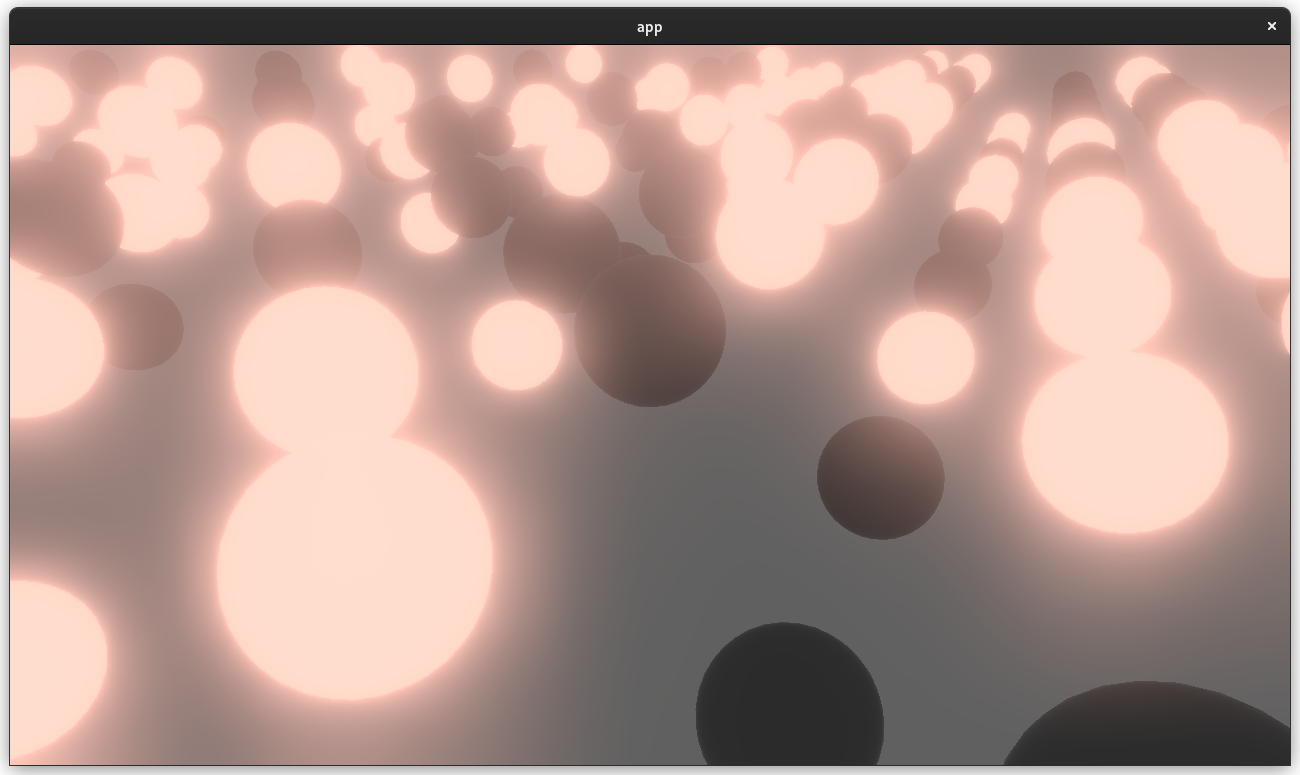
## Solution
- A threshold is applied to isolate emissive samples, and then a series of downscale and upscaling passes are applied and composited together.
- Bloom is applied to 2d or 3d Cameras with hdr: true and a BloomSettings component.
---
## Changelog
- Added a `core_pipeline::bloom::BloomSettings` component.
- Added `BloomNode` that runs between the main pass and tonemapping.
- Added a `BloomPlugin` that is loaded as part of CorePipelinePlugin.
- Added a bloom example project.
Co-authored-by: JMS55 <47158642+JMS55@users.noreply.github.com>
Co-authored-by: Carter Anderson <mcanders1@gmail.com>
Co-authored-by: DGriffin91 <github@dgdigital.net>
# Objective
- Add post processing passes for FXAA (Fast Approximate Anti-Aliasing)
- Add example comparing MSAA and FXAA
## Solution
When the FXAA plugin is added, passes for FXAA are inserted between the main pass and the tonemapping pass. Supports using either HDR or LDR output from the main pass.
---
## Changelog
- Add a new FXAANode that runs after the main pass when the FXAA plugin is added.
Co-authored-by: Carter Anderson <mcanders1@gmail.com>
# Objective
Add methods to `Query<&Children>` and `Query<&Parent>` to iterate over descendants and ancestors, respectively.
## Changelog
* Added extension trait for `Query` in `bevy_hierarchy`, `HierarchyQueryExt`
* Added method `iter_descendants` to `Query<&Children>` via `HierarchyQueryExt` for iterating over the descendants of an entity.
* Added method `iter_ancestors` to `Query<&Parent>` via `HierarchyQueryExt` for iterating over the ancestors of an entity.
Co-authored-by: devil-ira <justthecooldude@gmail.com>
# Objective
- Build on #6336 for more plugin configurations
## Solution
- `LogSettings`, `ImageSettings` and `DefaultTaskPoolOptions` are now plugins settings rather than resources
---
## Changelog
- `LogSettings` plugin settings have been move to `LogPlugin`, `ImageSettings` to `ImagePlugin` and `DefaultTaskPoolOptions` to `CorePlugin`
## Migration Guide
The `LogSettings` settings have been moved from a resource to `LogPlugin` configuration:
```rust
// Old (Bevy 0.8)
app
.insert_resource(LogSettings {
level: Level::DEBUG,
filter: "wgpu=error,bevy_render=info,bevy_ecs=trace".to_string(),
})
.add_plugins(DefaultPlugins)
// New (Bevy 0.9)
app.add_plugins(DefaultPlugins.set(LogPlugin {
level: Level::DEBUG,
filter: "wgpu=error,bevy_render=info,bevy_ecs=trace".to_string(),
}))
```
The `ImageSettings` settings have been moved from a resource to `ImagePlugin` configuration:
```rust
// Old (Bevy 0.8)
app
.insert_resource(ImageSettings::default_nearest())
.add_plugins(DefaultPlugins)
// New (Bevy 0.9)
app.add_plugins(DefaultPlugins.set(ImagePlugin::default_nearest()))
```
The `DefaultTaskPoolOptions` settings have been moved from a resource to `CorePlugin::task_pool_options`:
```rust
// Old (Bevy 0.8)
app
.insert_resource(DefaultTaskPoolOptions::with_num_threads(4))
.add_plugins(DefaultPlugins)
// New (Bevy 0.9)
app.add_plugins(DefaultPlugins.set(CorePlugin {
task_pool_options: TaskPoolOptions::with_num_threads(4),
}))
```